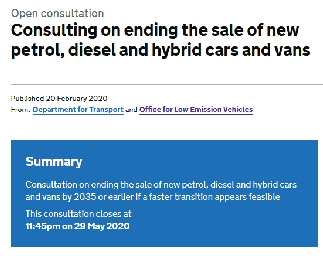DfT
consultation with concerns over petrol & diesel availability after
2035
The survey was announced on 20th February 2020 on the GOV.UK
website by the Department for Transport (DfT) and Office for Low
Emission Vehicles (OLEV).
See our NEWS item
200204
Little heard of the consultation
News of the consultation and how to respond has not seen much publicity,
although it has been a brief news item in Classic Car Weekly for the
last two weeks, so if you feel you want to participate doing so promptly
will be necessary.
Time to respond to the survey is short
The public
consulatation document says "we welcome the submission of
the public’s views as part of this consultation, these should
be sent to: communications@olev.gov.uk
or by post to:
Consultation Response
Office for Low Emission Vehicles
Zones 3/29-33
33 Horseferry Road
London SW1P 4DR
Responses need to be made as soon as possible but no
later than end of Friday 29 May 2020".
Posted: 200301 |

The consultation seeks views on:
> the phase out date.
> the definition of what should be phased out
> barriers to achieving the above proposals
> the impact of these ambitions on different sectors of industry
and society
> what measures are required by government and others to
achieve the earlier phase out date. |
The
Prime Minister announced
on 4th February 2020 that the UK Government is seeking views
on bringing forward the end to the sale of new petrol, diesel
and hybrid cars and vans from 2040 to 2035, or earlier if
a faster transition appears feasible. An open consultation was
published on 20th February 2020 on the GOV.UK website by the
Department for Transport (DfT) and the Office for Low Emission
Vehicles (OLEV). GOV.UK
Inclusion of hybrids was a surprise
The inclusion of hybrids for the first time was seen by many
as a surprise, particularly those buying hybrids. They tend
to see hybrids as a useful transition from fossil fuel to "all
electric" whilst retaining the freedom to "stop-fill-go"
at filling stations and avoiding the "plan ahead for charging
points" constraint which many drivers find a daunting behaviour
change.
Continuing use of fossil fuel cars
The proposals relate to new cars and vans - owners of existing
petrol, diesel and hybrid cars and vans will still be able to
use these vehicles and buy and sell them on the used market.
Access to some areas, from the imposition of low emission zones
mainly in urban areas, could constrain the use of fossil fuel
vehicles then and in subsequent years. |
|
Consequences
of the end of new fossil fuel cars
A key issue for drivers wishing to continue to use a fossil
fuelled car after a 2035 deadline will inevitably be the continuing
availability and cost of motor fuels. If the transition
to non fossil fuel cars is successful then post 2035 the number
of fossil fuel cars on the roads will fall as they reach the
stage when they are scrapped. With a reducing number of fossil
fuel cars still running the demand for fuel from filling stations
will decline and the economics of continuing to have fuel
pumps there will inevitably lead to rising motor fuel costs
and many forecourts ceasing to have fuel pumps enabling
drivers to fill up.
Prospects for classic car enthusiasts
With the likelihood of reducing availability of fuel pumps
on forecourts and rising fuel costs after 2035/2040, there
will be concerns for classic car owners. Whether representative
bodies like the Federation of British Historic Vehicle Clubs
(FBHVC) will be successful in maintaining classic car access
to public roads as the remaining stock of fossil fuel cars
reduces - say by 2050 and beyond - will be be crucial to the
continuation of the enjoyment of classic cars. Failing that
continuation will the prospect be one of classics being stored
in museums?
|
|



